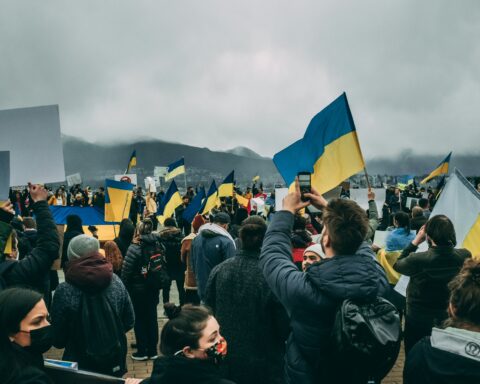Canada turned 150 on July 1. From “a few acres of snow” it has been transformed into one of the world’s most prosperous countries, consistently ranking in the top 10 happiest places to live. It is also a global leader in human rights and multiculturalism.
Canadians of Ukrainian descent were instrumental in developing both concepts. Walter Tarnopolsky led the articulation of human rights and civil liberties domestically and internationally. In his honour, the Walter Tarnopolsky International Jurist Award is given to distinguished contributors for work in these areas.
In his maiden Senate speech another Ukrainian Canadian formulated the notion of Canada’s multicultural reality. Sen. Paul Yuzyk is viewed as the father of multiculturalism. Furthermore, in a dissenting report of the Royal Commission on Bilingualism and Biculturalism (1966), member Dr. Jaroslav Rudnyckyj argued against biculturalism. He called for the recognition of Canada’s multicultural reality rather than the enshrinement of Anglo-Celtic and French cultures at the expense of all others.
Canada’s multicultural legislation and its Charter of Rights and Freedoms reflect the work of these notable individuals.
Other far-reaching contributions include the pioneering work in cancer detection by Dr. Sylvia Fedoruk – later the lieutenant governor of Saskatchewan – and Dr. Roberta Bondar, Canada’s first female astronaut.
Therefore, it is surprising that the contributions of Canadians of Ukrainian descent – pioneers since 1887 and developers of western Canada – have received little recognition to date in this historic year. Is the Ukrainian connection being white washed?
Perhaps a partial answer lies here. The highlight of Canada’s 150 birthday party in Ottawa was the naming of two new astronauts: Jennifer Sidey and Joshua Kutryk.
Ms. Sidey said she was inspired by Dr. Bondar. Her forebears arrived from Ukraine at the turn of the 20th century. Mr. Kutryk has a distinct Ukrainian surname and hails from Alberta, the heart of Ukrainian Canada.
Yet there was no linking of these exceptional Canadians to their roots. Despite this omission, there was much praise for Canada’s diversity at the celebrations on Parliament Hill. Prince Charles said it made Canada a wonderful country; Prime Minister Justin Trudeau celebrated it: Diversity is Canada’s answer to dealing with hardship and discrimination.
It was not always so.
Ukrainians were among the first non-Anglo-Celtic or French minorities to arrive here. Being first is tough. Hardship and discrimination were as brutal then as they are today in the most unfortunate countries. There were no roads, no hospitals, schools or churches. Officials allocated some of the worst land to the “men in sheepskin coats,” and mocked their dress, language and ethnic origin. The internment of Ukrainians during World War I is now seen as a dark moment in Canada’s history.
It can be said, therefore, that Canada learned how to be a “kinder and gentler society” on the backs of the hundreds of thousands that poured in from Ukraine at the turn of the 20th century. Their experiences led directly to the development of human rights and multiculturalism for Canada.
So why, on its big birthday, is their outstanding contribution not acknowledged? Has multiculturalism lost its place? Has it become less valuable as other diverse groups – women, visible minorities, the disabled, the LGBT community – advance?
As always, the squeaky wheels get the grease. The Native Indian nations, for instance, received considerable attention during the birthday celebrations. Most likely it’s because they asserted themselves. They erected an illegal but most prominent teepee on the Parliament grounds that they claim to be their land.
Under-recognition is a form of discrimination too. Dr. Bondar and Mr. Kutryk must not be thrown into an Anglo-Celtic/French melting pot that removes these astronauts’ distinct Ukrainian identity. To do so is to go backwards. It is not Canadian. It is wrong. It dishonors and diminishes the work of Messrs. Tarnopolsky, Yuzyk and Rudnyckyj.
Multi-diverse Canadians – that’s all of them – are strengthened when one of their own succeeds: A young woman is inspired to become an astronaut because a woman who is Ukrainian Canadian – a double minority – made it to the stars. Such success proves that Canada works for all.
Going forward, more work is needed in coming to grips with the notion of unity in multicultural diversity. This is particularly pressing as the world’s population shifts among countries at unprecedented rates due to economic imperatives, wars and climate change.
Canadians, comprising 200 different ethnic groups, live this daily. The Ukrainians in Canada led the way with human rights and multiculturalism. Perhaps they will lead in dealing with this issue as well. First, however, they need to be recognized both at home and abroad for these world-changing contributions.
Republished with permission from the Ukrainian Weekly.
Oksana Bashuk Hepburn is a former director with the Canadian Human Rights Commission, senior adviser to the Government of Canada and president of consulting firm dealing with Canada/Ukraine relations that writes on international issues in Canadian and other outlets.




